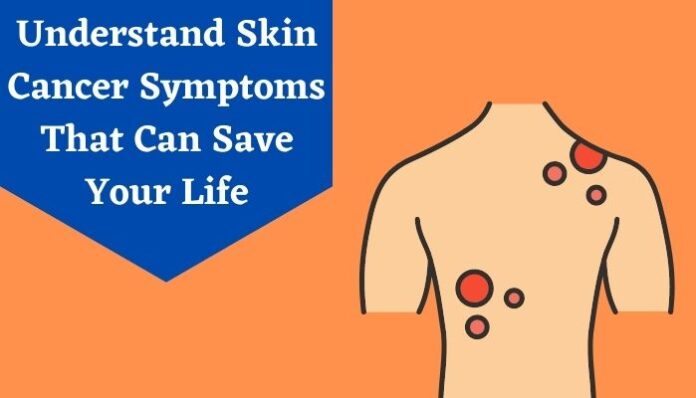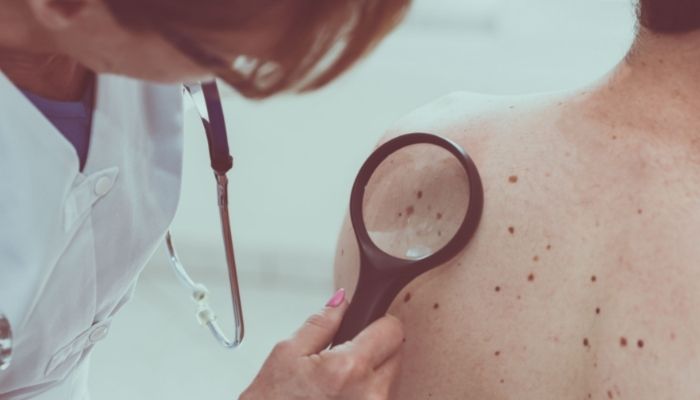Out of all types of cancers, it is a skin cancer that is most of the time curable, provided detected in its early stage. So, what are the early signs of skin cancer? We will disclose all the early skin cancer signs, but before that let us acquaint you with skin cancer in general. Skin cancer is a term given to any sort of abnormal skin cell growth in the body. The main reason coined by experts for skin cancer is exposure to harmful UV rays of the sun. Understanding the type of skin cancer based on its symptoms plays a key role in figuring out the best treatment for it.
Let us acquaint you with the common skin cancer symptoms to detect the disease at an early stage.
Types of Skin Cancer
Much of the relief from aggravating the signs of skin cancer, no matter whichever type it is can be found by limited skin exposure to harmful sunlight in the middle hours of the day. Besides, as we said, one should be vigilant enough to catch the early signs of skin cancer to get a proper treatment to get rid of it.
Skin cancer is classified into main three types and they are:
- Basal Cell Carcinoma
- Squamous Cell Carcinoma
- Melanoma
Early Signs of Skin Cancer
Different types of skin cancers may show different symptoms, so let us now understand the varied early
early skin cancer symptoms.
1. Basal Cell Carcinoma Symptoms
Basal Cell Carcinoma is the most common type of skin cancer that often shows symptoms on the neck and face of a person. Some of the common early symptoms of this skin cancer are:
- Flat and Brown Scar sort of lesions
- Waxy and pearly bump on face or neck
- Bleeding from bumps
2. Squamous Cell Carcinoma Symptoms
Face, neck, hands, and ears are the places that generally get affected by the symptoms of squamous cell carcinoma skin cancer. Some of its symptoms are:
- Flat lesion with a crusted or scaly surface
- Red and firm nodule
3. Melanoma Symptoms
This third type of skin cancer can grow on any part of the body and even in an existing mole on the skin. Some of the common signs of this type of skin cancer are:
- Change in the color, size, and feel of the moles
- A painful lesion that burns or itches
- Darker lesions on soles, fingertips, palms, toes, vagina, anus, nose, and mouth lining
- Brownish spots with dark speckles on the skin
- Small lesion appearance with an irregular red, blue, or blue-black border
Signs of Other Less Common Types of Skin Cancers
Besides these three common types of skin cancers, there are other types too that can show some other symptoms. Let us check those signs of other types of skin cancers too:
1. Merkel Cell Carcinoma
The common signs of this type of rare skin cancer is patches or abnormal growth on the neck, head, or trunk.
2. Kaposi Sarcoma
This is one of the rarest types of skin cancers that show signs like purple or red patches on the mucous membranes or skin. It basically affects people with a weaker immune system.
3. Sebaceous Gland Carcinoma
This type of less common skin cancer doesn’t really show any clear signs and symptoms, which makes it difficult to detect.
Potential Causes of Skin Cancer
As we mentioned earlier, the most potential cause of any type of skin cancer is exposure to sunlight and harmful ultraviolet rays. Besides, some other risk factors that may show skin cancer symptoms are:
1. History of Sunburns
People with a tendency of getting sunburns have a higher risk of suffering from some type of skin cancer.
2. Fair Skin
It may sound strange, but people will less melanin in the skin and a fairer complexion are at a higher risk of suffering from skin cancer.
3. High Altitude Climate
Those living in high altitude climate regions tend to get exposed to harmful sun rays more than lower altitude climate regions people. This makes them fall at a higher risk of skin cancer.
4. Moles
It has been observed that people with moles like dysplastic nevi are more prone to suffer from skin cancer.
5. Radiation Exposure
Those who are undergoing radiation therapy for some kind of skin disorder, then you are more susceptible to skin cancer.
6. Family History of Skin Cancer
If cancer runs into your family, then chances are high that you may too suffer from some type of skin cancer in life.
7. Weak Immune System
Up next, people with a weak immune system are more prone to skin cancer.
Diagnosis of Skin Cancer
Following are the two ways to diagnose skin cancer:
- Skin Examination: If you detect early signs of skin cancer, you must consult your doctor for a skin examination. The doctor will check your skin and if required recommend further testing to confirm it is skin cancer and of what type.
- Skin Biopsy: The sure shot way of diagnosing skin cancer is by collecting a sample of the affected area through a skin biopsy. The biopsy results will determine whether it is skin cancer or something else.
Also Read: Top 10 Best Cancer Hospitals In India For Free Cancer Treatment
The Bottom Line
In a nutshell, cancer of any sort can be life-threatening, so you must try to catch its early signs. Skin cancer is indeed the most curable type of cancer but again for it, you need to detect it in its early stage. We are acquainted with the risk factors that lead to skin cancer, so make sure to watch for them closely and regularly. If you notice any abnormal skin growth, do consult your doctor at the earliest with a list of questions. This will help you get timely treatment and you will be in a better position to get rid of skin cancer.

